Results
-
 £70.50
£70.50Suite from Fantastic Beasts and Where to Find Them - Composed by James Newton Howard / arr. Patrick Roszell (contains "Hedwig's Theme" by John Williams)
J.K. Rowling's story of Fantastic Beasts and Where to Find Them will mezmerize your audiences as it follows the adventures of Newt Scamander, featuring James Newton Howard's music from the hit movie. Beginning with a hint of John Williams' "Hedwig's Theme," the medley includes "Main Titles," "Newt's Friend," and "End Credits." The magic, mystery, and wonder swirl, twirl, and spiral in this compelling arrangement with wizardly delicious parts for all. (4:15) This title is available in MakeMusic Cloud.
Estimated delivery 3-5 days
-
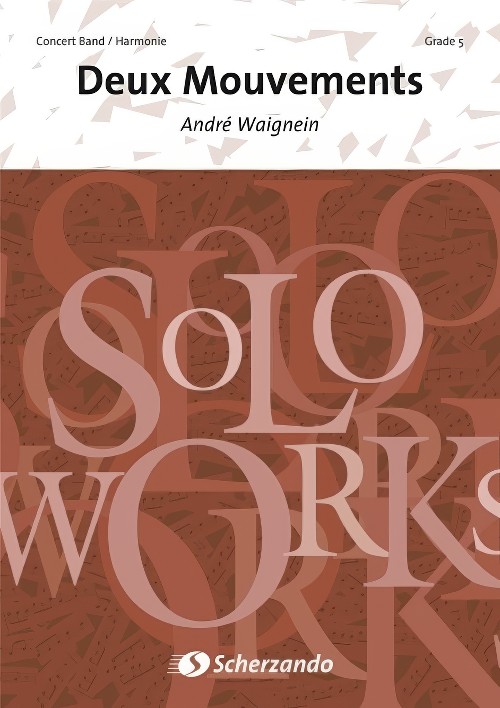 £154.99
£154.99Deux Mouvements (Alto Saxophone Solo with Concert Band - Score and Parts)
Early in 1989 Jean Baily, director of the Royal Conservatoire in Bruxelles, asked his very close friend Andre Waignein to compose a piece which could be performed by the conservatoire's saxophone class. Andre Waignein was readily agreeable. Not only was his father a saxophone player, but himself felt strongly attracted to the instrument and he was further encouraged into accepting the commission by his friend Alain Crepin, saxophone teacher at the Bruxelles Conservatoire.The piece he composed consists of two movements, hence the title. An elegy is expressed by means of a melody which is full with pronounced magnanimity, full of spectacular musical freedom enabling the soloist to express himself to the full. In this movement the melodic element is of the utmost importance.The capriccio, the second movement is musically disconcerting. The band's accompaniment is particularly important. Due to the high notes, the soloist brings this capriccio to a close with enthusiastic virtuosity.Duration: 9:15
Estimated delivery 7-14 working days
-
 £68.00
£68.00Requiem Aeternam - Giacomo Puccini
Giacomo Puccini was commissioned to write a second opera after the resounding success of his first, Le Villi. However, the original four-act, grand opera Edgar, to a libretto by Ferdinando Fontana, received a rather lukewarm reception at its premire in La Scala in Milan in 1889 - initially, the work was only performed three times. Of all the planned performances in the subsequent two years, only one took place, in Lucca, Puccini's birthplace. There, the work was well received. Nevertheless, the composer decided to make drastic changes to Edgar the most radical being the reduction of the opera to three acts, as well as altering a few arias, charactersand instrumental parts. In its revised form, the work was even less popular than before. The discarded fourth act later provided material for Tosca (the duet Amoro sol' per te), but Puccini never felt the need to defend Edgar - as he did other less fortunate operas, such as La Rondine and Suor Angelica. On a piano excerpt for his female friend Sybil Seligman he even corrupted the title to 'E Dio ti GuARda da quest' opera' (may God preserve you from this opera). This did not prevent Arturo Toscanini performing the Requiem from the third act at Puccini's funeral in Milan Cathedral on 3 December 1924. The Requiem in the third act is being played when the long funeral procession carries the alleged body of Edgar - the confusedyoung man hesitating between the love of the virtuous Fidelia and the exotic Tigrana. The mass hails Edgar as a hero, but a monk claims that he has betrayed his country for a few gold pieces. When the soldiers try to desecrate the body, they discover that the armor contains none. The monk reveals himself as Edgar. He wants to leave with his faithful Fidelia, but the vengeful Tigrana stabs him and kills Fidelia. Edgar grieves over the lifeless body of his beloved, while Tigrana is arrested and the people submerge into prayer.
Estimated delivery 7-14 working days
-
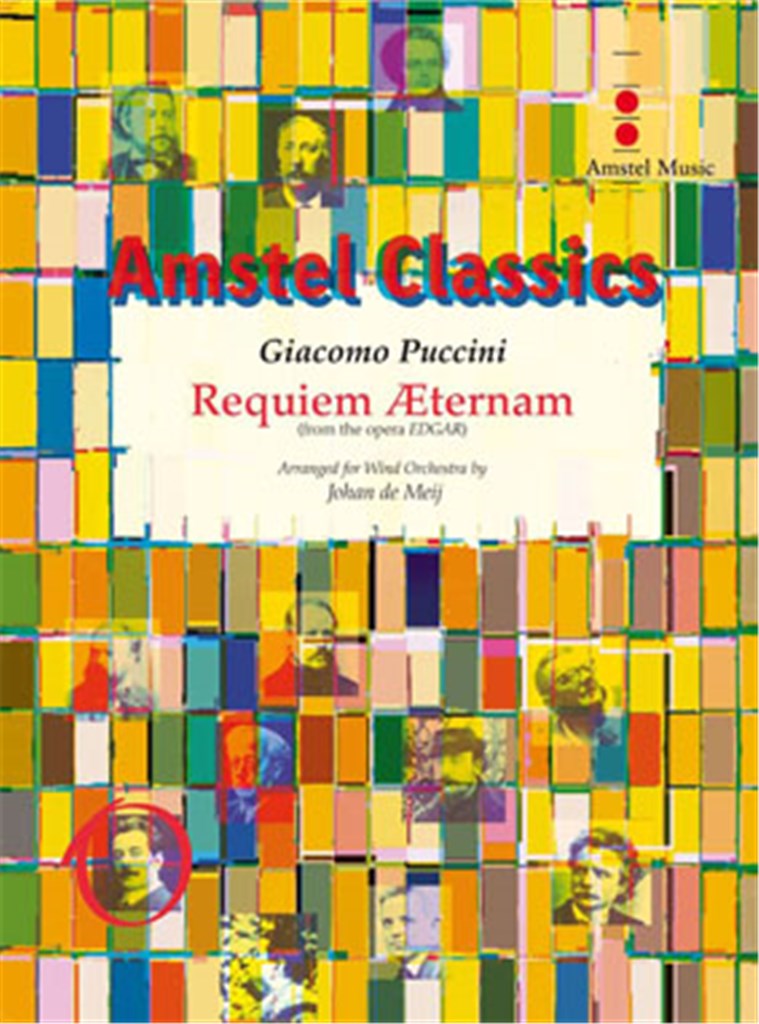 £68.00
£68.00Requiem Aeternam (from Edgar) (Concert Band - Score and Parts) - Puccini, Giacomo - De Meij, Johan
Giacomo Puccini was commissioned to write a second opera after the resounding success of his first, Le Villi. However, the original four-act, grand opera Edgar, to a libretto by Ferdinando Fontana, received a rather lukewarm reception at its premiere in La Scala in Milan in 1889. Initially, the work was only performed three times. Of all the planned performances in the subsequent two years, only one took place, in Lucca, Puccini's birthplace. There, the work was well received. Nevertheless, the composer decided to make drastic changes to Edgar the most radical being the reduction of the opera to three acts, as well as altering a few arias, characters and instrumental parts. In its revised form, the work was even less popular than before. The discarded fourth act later provided material for Tosca (the duet Amoro sol' per te), but Puccini never felt the need to defend Edgar as he did other less fortunate operas, such as La Rondine and Suor Angelica. On a piano excerpt for his female friend Sybil Seligman he even corrupted the title to 'E Dio ti Guarda da quest' opera' (may God preserve you from this opera). This did not prevent Arturo Toscanini performing the Requiem from the third act at Puccini's funeral in Milan Cathedral on 3 December 1924. The Requiem in the third act is being played when the long funeral procession carries the alleged body of Edgar, the confused young man hesitating between the love of the virtuous Fidelia and the exotic Tigrana. The mass hails Edgar as a hero, but a monk claims that he has betrayed his country for a few gold pieces. When the soldiers try to desecrate the body, they discover that the armor contains none. The monk reveals himself as Edgar. He wants to leave with his faithful Fidelia, but the vengeful Tigrana stabs him and kills Fidelia. Edgar grieves over the lifeless body of his beloved, while Tigrana is arrested and the people submerge into prayer. Duration: 3.30
Estimated delivery 7-14 working days
-
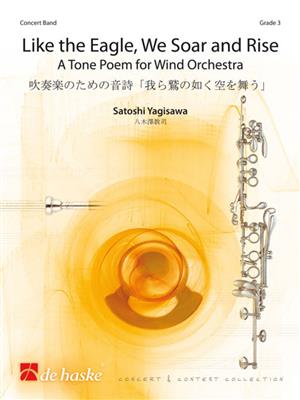 £144.99
£144.99Like the Eagle, We Soar and Rise - Satoshi Yagisawa
Like the Eagle, We Soar and Rise was commissioned by Yuying Secondary School Concert Band and Yuying Alumni Association for the 2010 centenary of the school's foundation. The piece was named by a friend of the composer named Steven Phua, who originally suggested commissioning a new piece to Satoshi Yagisawa. The piece furthermore takes its name from the text of the Yuying Secondary School song.This composition is based on three different concepts: the first one demonstrates 'The founders' passion for education'; the second concept illustrates 'Hardship in war time'; the third one 'To the future' describes the inner strength people find to overcome struggles. Thispiece concludes with a fanfare, which is the sound of hope that leads to a brighter future in a positive direction.The world premiere of this piece was conducted by Faizal Bin Othman, who is one of the leading educators in Singapore, and was performed by the Yuying Secondary School Concert Band.
Estimated delivery 7-14 working days
-
 £84.99
£84.99Axis - Naoya Wada
I composed Axis as a dedication to my friend Shinya Nakamitsu. He is a wonderful graphic designer who loves wind band music. Some years ago, I made a demo CD to hand out to a number of people. He oversaw the jacket design for that project and I composed this traditional march to thank him. Shinya Nakamitsu runs a design company called AXIS: hence the name of the composition.
Estimated delivery 7-14 working days
-
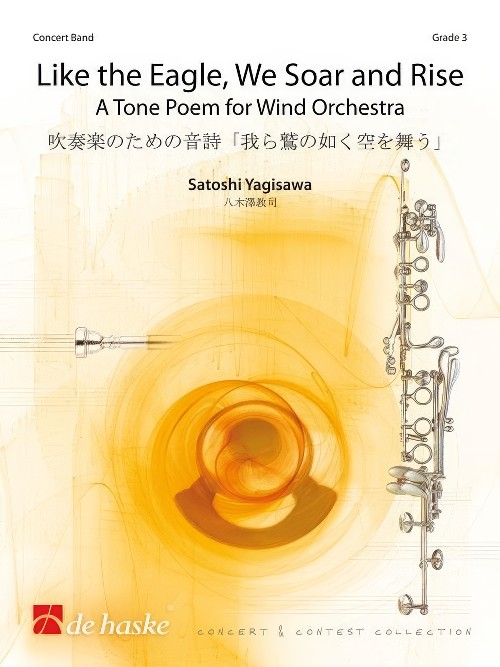 £144.99
£144.99Like the Eagle, We Soar and Rise (Concert Band - Score and Parts) - Yagisawa, Satoshi
Like the Eagle, We Soar and Rise was commissioned by Yuying Secondary School Concert Band and Yuying Alumni Association for the 2010 centenary of the school's foundation. The piece was named by a friend of the composer named Steven Phua, who originally suggested commissioning a new piece to Satoshi Yagisawa. The piece furthermore takes its name from the text of the Yuying Secondary School song.This composition is based on three different concepts: the first one demonstrates 'The founders' passion for education'; the second concept illustrates 'Hardship in war time'; the third one 'To the future' describes the inner strength people find to overcome struggles. This piece concludes with a fanfare, which is the sound of hope that leads to a brighter future in a positive direction.The world premiere of this piece was conducted by Faizal Bin Othman, who is one of the leading educators in Singapore, and was performed by the Yuying Secondary School Concert Band.Duration: 8.00
Estimated delivery 7-14 working days
-
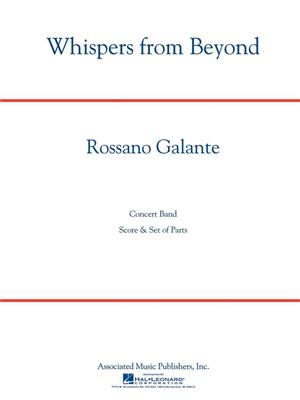 £76.99
£76.99Whispers from Beyond - Rossano Galante
Composed as a tender tribute to a lost friend, this is meant not to be a mournful piece, but rather a joyous remembrance of a life ended too soon. The work features two primary themes that ebb and flow as the music progresses. Soaring melodic lines and rich orchestration help bring character and distinction to this effective and emotional piece. Dur: 4:00
Estimated delivery 7-14 working days
-
 £87.99
£87.99In the Bleak Mid-Winter - Gustav Holst
Christina Rossetti wrote the words to this famous Christmas carol in 1872 in response to a request from the magazine Scribner's Monthly for a Christmas poem. They were set to music by Gustav Holst (1874-1934) for inclusion in the first edition (1906) of The English Hymnal, edited by his life-long friend, Ralph Vaughan Williams. Philip Sparke has carefully arranged the beautiful melody into this delightful version for concert band. A must for any Christmas concert.
Estimated delivery 7-14 working days
-
 £126.50
£126.50Slava! - Wind Band - Leonard Bernstein
The first theme of Slava! is a vaudevillian razz-ma-tazz tune filled with side-slipping modulations and sliding trombones. The second theme is a canon, and after a brief development section, the two themes recur in reverse order. Near the end, they are combined with a quotation (proclaimed by the ubiquitous trombones) from the Coronation Scene of Moussorgsky's 'Boris Goudonov', where the chorus sings the Russian word slava!, meaning, glory! In this way, the composer is paying homage to his friend Mistislav Rostropovich, called 'Slava' by his friends and to whom the overture is fondly dedicated. The overture was written to celebrateRostropovich's inauguration as music director of the National Symphony Orchestra in Washington, D.C., in 1977. Leonard Bernstein, the son of a Russian immigrant, was born near Boston, Mass., and studied composition at Harvard. Called 'an authentic American hero, an arts hero,' Bernstein had a distinguished career as composer and conductor. - James Huff
Estimated delivery 7-14 working days
